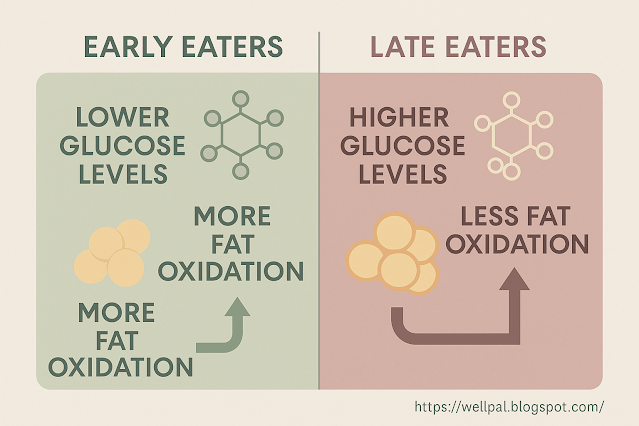- Get link
- X
- Other Apps
- Get link
- X
- Other Apps
BioSyncing Series - 2
🕒 TL;DR (Too Long; Didn’t Read)
When you eat can be just as important as what you eat.
Eating earlier in the day supports better digestion, glucose control, and fat metabolism.
Consistent meal timing helps align your gut and metabolic health with your circadian rhythm.
Alt text: A visual chart showing digestive enzyme levels peaking in the morning and declining at night. Blog address https://wellpal.blogspot.com/ placed subtly in the corner.
🧪 Self-Check: Is Your Meal Timing Supporting Your Metabolism?
💬 Expert Dialogue: “Can Meal Timing Really Change My Health?”
Jared (Busy Professional): "I usually eat dinner around 9 or 10 PM. Is that a problem, even if I eat healthy food?"
Dr. Lillian Brooks (Nutritional Scientist): "It actually might be. Your body’s metabolism slows down at night. Eating late can disrupt your glucose regulation and even impair sleep."
Jared: "So it’s not just about calories in, calories out?"
Dr. Brooks: "Exactly. Your circadian rhythm regulates hormone release, digestion, and energy use. Studies show that eating most of your calories earlier in the day—especially breakfast and lunch—supports metabolic health."
Jared: "But I’m not hungry in the morning."
Dr. Brooks: "That could be a sign your rhythm is out of sync. Try gradually shifting your meals earlier. Your hunger cues will adjust."
Alt text: Side-by-side infographic comparing glucose levels and fat oxidation between early and late eaters. Blog address https://wellpal.blogspot.com/ in footer.
🔬 The Science of Chrono-Nutrition
Meal timing, also known as chrono-nutrition, studies the interaction between food intake and your circadian rhythm. This internal 24-hour clock influences your digestion, hormone cycles, and metabolism.
🧬 1. Circadian Control of Digestion
The gut has its own clock that controls enzyme release, motility, and nutrient absorption.
Peak digestion occurs earlier in the day—typically from 8 AM to 3 PM.
Eating late at night can lead to poor digestion, bloating, and acid reflux.
Study: A 2020 paper in Cell Metabolism showed that eating later in the day led to decreased energy expenditure and increased hunger hormones.
🔁 2. Insulin Sensitivity by Time of Day
Your cells are more insulin-sensitive in the morning.
Eating high-carb meals at night may spike blood sugar and increase fat storage.
Study: The Journal of Clinical Endocrinology found that early eaters had significantly lower insulin resistance.
🥗 3. Time-Restricted Eating
Limiting food intake to a 10–12-hour window (e.g., 8 AM–6 PM) improves metabolism and gut microbiome diversity.
Early Time-Restricted Feeding (eTRF) aligns better with the body's natural rhythms.
Study: Satchin Panda’s research at the Salk Institute showed improved sleep, weight, and glucose levels with eTRF.
Alt text: Illustrated 24-hour clock with a 10-hour eating window highlighted (e.g., 8 AM to 6 PM). Blog address https://wellpal.blogspot.com/ clearly displayed.
🌟 Personal Story: How Meal Timing Reset My Energy and Digestion
A few years ago, I struggled with afternoon crashes and persistent bloating. No matter how clean I ate, I’d feel sluggish after lunch and wired late at night. A friend introduced me to the concept of early time-restricted eating (eTRF). I was skeptical, but I shifted my meals to 8 AM–6 PM for just one week.
By day 4, I noticed I was falling asleep faster, waking up rested, and feeling lighter throughout the day. Even my digestion improved—less bloating, more regularity. I didn’t change my what, only my when. That simple shift helped realign my body’s natural rhythm and energy.
📊 Quick Poll – When Do You Usually Eat Dinner?
❓ FAQ – Reader Questions About Meal Timing
Q1: I’m not hungry in the morning—should I still eat early?
👉 Gradually shift your last meal earlier. Your morning appetite will adjust.
Q2: Is it okay to fast until lunch and still be healthy?
👉 Yes, if it aligns with your lifestyle. Just avoid eating too late in the evening.
Q3: What’s the best time to eat dinner?
👉 Ideally before 7 PM. The earlier, the better for digestion and sleep.
Q4: Does time-restricted eating cause muscle loss?
👉 Not if you get enough protein and train regularly. Many studies show no adverse effects on muscle.
Q5: Can timing really affect weight loss?
👉 Yes. Aligning meals with circadian biology improves insulin sensitivity and fat metabolism.
🧭 Navigation
💡 Call to Action
Meal timing isn’t about restriction—it’s about rhythm. When you sync your meals with your biology, you unlock better digestion, energy, and mental clarity. Start by shifting your last meal just 30 minutes earlier this week.
Stay curious. Stay consistent. And remember, small steps lead to big change. 🌱
Explore 14 curated wellness blog series to nourish your mind and body—all in one place.
💚 Thank you for reading!
We hope this post helped you feel more informed, supported, and inspired.
Stay well and come back anytime.
Chrono-Nutrition
Circadian RhythGut Health
Digestive Wellness
Health Optimization
Healthy Habits
Intermittent Fasting
Meal Timing
Metabolism
Weight Balance
- Get link
- X
- Other Apps




Comments
Post a Comment